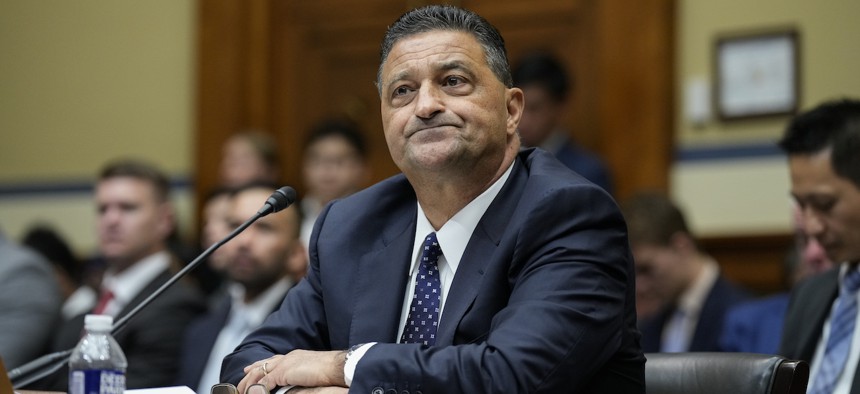
Homeland Security Inspector General Joseph Cuffari testifies during hearing on June 6, 2023. Drew Angerer/Getty Images
Judge tosses IG’s lawsuit alleging harassment by oversight body investigating him
A watchdog of watchdogs is acting appropriately by investigating the inspector general, court rules.
A federal court on Thursday dismissed a case brought by the Homeland Security Department’s watchdog, saying he failed to demonstrate that an oversight body investigating him has amounted to unlawful harassment.
The lawsuit, filed in the U.S. District Court for the Eastern District of Virginia and heard by U.S. District Judge Rossie Alston, alleged that for three years Inspector General Joseph Cuffari “has been endlessly harassed and had his office’s resources drained by a series of baseless inquiries headed by the Council of the Inspectors General on Integrity and Efficiency’s Integrity Committee.”
The court, however, denied that Cuffari and his co-plaintiffs have suffered any serious harm as a result of CIGIE’s investigation.
“Because plaintiffs have not plausibly alleged any harm stemming from the IC complaints filed against them over and above the inconvenience of having to obtain counsel and respond to government inquiries, the court finds that their allegations fall short of establishing an injury in fact,” the judge wrote.
Under the lawsuit, Cuffari alleged that shortly after he took office he was made aware of existing issues within his office that predated his arrival. OIG employees flouted rules and disrespected authority, Cuffari and his co-plaintiffs said. The IG made various protected disclosures to Congress and after the Integrity Committee decided not to take up an investigation, he engaged the law firm of Wilmer Hale.
After Wilmer Hale issued a report that Cuffari said vindicated him, he took steps to "reestablish order within DHS OIG." In his lawsuit, Cuffari said he was then "targeted by a relentless stream of meritless retaliatory complaints" stemming from CIGIE. CIGIE, whose members are IGs, and its Integrity Committee, which reviews allegations made against IGs and top IG staff, were created and authorized by the 2008 Inspector General Reform Act.
Joining Cuffari in the suit were Kristen Fredericks, chief of staff to the IG and a member of the Senior Executive Service; James Reed, chief counsel to the IG and a member of the Senior Executive Service; and Joseph Gangloff, who retired in December 2019 after 43 years of government service,
The plaintiffs asked the court to enjoin the Integrity Committee's actions against them and prohibit further actions against them without an order from the court. They also argued several issues related to CIGIE’s operation were unconstitutional, including the Integrity Committee’s policies and procedures, the committee's structure and its funding mechanism.
Cuffari, a Trump appointee and former aide to Republican Arizona Govs. Doug Ducey and Jan Brewer, has faced significant criticism throughout his tenure, including for reported ethical issues earlier in his career. He has also been subject to allegations that he delayed and mishandled reports on sexual assault and the Jan. 6, 2021 attack on the Capitol.
Several lawmakers and outside watchdog groups have called on Cuffari to resign. Last year, the Project on Government Oversight published a letter from an unknown number of anonymous employees at the DHS IG office imploring Biden to remove Cuffari, citing the workforce’s lack of trust. Democrats have accused Cuffari of obstructing their investigations. Cuffari has pushed back on each of the allegations.
Earlier this year, Cuffari agreed to pay a former top official in his office $1.2 million as part of a settlement agreement that also overturned the employee's firing. Cuffari had fired the employee, former deputy inspector general, after commissioning a $1.4 million third-party investigation into her and two of her colleagues, which found she had engaged in divisive and unprofessional behavior. Cuffari recently admitted to Congress he regularly deleted text messages from his government phone, which many key Democrats called the last straw in pushing for his resignation or firing.
In his lawsuit, Cuffari said he was harmed because CIGIE labeled parts of its investigation as related to his personal matters and the IG was therefore not eligible for government representation. The judge ruled that decision was entirely appropriate and therefore it did not cause any injury. The plaintiffs also argued they will be subject to a public report that damages their reputations, but the judge said that was speculative as it depends on CIGIE’s findings. Alston similarly found the plaintiffs’ case was not “ripe”—meaning it was brought prematurely—as CIGIE has not yet released the results of its investigation.
“It is entirely possible that the IC investigations into plaintiffs will end without any adverse determinations, thereby obviating the need for this court to weigh in on the constitutional issues plaintiffs raise,” the judge said.
The IG’s office did not respond to a request for comment on the decision.
NEXT STORY: From payment accuracy to program integrity







